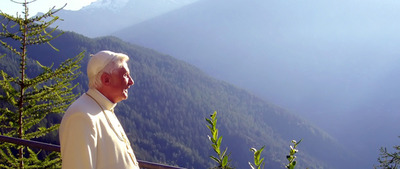In his short pontificate Pope Benedict XVI became the “green pope.” He was the one who really did do much to bridge a gap between faith and ecology. In his mind, faith and ecology appeals not only a respect for the environment but it is integral for a profound respect for human dignity, womb to tomb. Hence, a respect for creation is also a pro life stance; pro life work is properly called a “human ecology.”
The Brazilian bishops in 2011 heard Benedict teach that “man is not God, but his image, that is why he must try to be more sensitive to the presence of God in what surrounds him: in all creatures and, especially, int eh human in whom there is a certain epiphany of God.” To do otherwise, establishes in humanity “contempt for himself and for what surrounds him.”
Hence, “This is why the first ecology that must be defended is ‘human ecology.’ That is, without a clear defense of human life, from its conception to its natural death, without a defense of the family based on marriage between a man and a woman, without a defense of those who are excluded and marginalized by society, without forgetting in this context those who lose everything, victims of natural disasters, there can never be talk of a genuine defense of the environment…. [There is] “an imperative that stems from the awareness that God entrusts his creation to man, not so that he can exercise over it an arbitrary dominion, but to preserve and care for it, as a son takes care of his father’s inheritance.”
Actually, the church can call other popes by the same title. Nevertheless, the emphasis today is care for what has given us as a gift to cherish, and to work effectively with, the earth. In 2011 Benedict addressed Italian students calling them to be “guardians of nature” by walking the path prepared by Saint Francis of Assisi, patron saint of ecology.
Today is Earth Day, an observance started in 1970 to encourage us to breathe fresh air, enjoy nature and do something respectful of creation.
The pope emeritus said, “Today more than ever, it has becomes clear that respect for the environment cannot forget the recognition of the value of the human person and its inviolability at every stage and in every condition of life. Respect for the human being and respect for nature are one, but both can grow and find their right measure if we respect in the human being and in nature the Creator and his creation. On this, dear young people, I believe to find allies in you, true “guardians of life and creation.”
In 2010, Pope Benedict wrote in message on the World Day of Peace,
Twenty years ago, Pope John Paul II devoted his Message for the World Day of Peace to the theme: Peace with God the Creator, Peace with All of Creation. He emphasized our relationship, as God’s creatures, with the universe all around us. “In our day”, he wrote, “there is a growing awareness that world peace is threatened … also by a lack of due respect for nature“. He added that “ecological awareness, rather than being downplayed, needs to be helped to develop and mature, and find fitting expression in concrete programs and initiatives.” Previous Popes had spoken of the relationship between human beings and the environment. In 1971, for example, on the eightieth anniversary of Leo XIII‘s Encyclical Rerum Novarum, Paul VI pointed out that “by an ill-considered exploitation of nature (man) risks destroying it and becoming in his turn the victim of this degradation”. He added that “not only is the material environment becoming a permanent menace – pollution and refuse, new illnesses and absolute destructive capacity – but the human framework is no longer under man’s control, thus creating an environment for tomorrow which may well be intolerable. This is a wide-ranging social problem which concerns the entire human family.”
Various churchmen, including Blessed John Paul II and Benedict XVI have lent their voices to those of Patriarch Bartholomew’s in drawing our attention to have care and concern for the earth. Indeed, our ecumenical and interfaith partners have provided some good work to demonstrate in concrete way our respect for the Earth. The thinking is based on the biblical narrative and a ecclesial tradition.
Some Church and ecumenical documentation:
If You Want to Cultivate Peace, Protect Creation by Pope Benedict XVI, January 10, 2010
Environmental Justice Program: Caring for God’s Creation by the U.S. Catholic Bishops
Catholic Church on Environmental Degradation, Interfacing Theology and the Natural Sciences, Marquette University
The National Religious Partnership for the Environment, Jewish, Catholic, Protestant and Eastern Orthodox Collaborative Efforts
NCC Eco-Justice Program , Eco-Justice, Environmental Justice, Environment and Faith, National Council of Churches of Christ
The Church, the Environment and the U.N. Millennium Goals (Catholic News Service)
Climate Change Justice and Health by the U.S. Catholic Bishops
Renewing the Earth, a pastoral letter by the U.S. Catholic Bishops, 1991
Global Climate Change: A Plea for Dialogue, Prudence, and the Common Good by the U.S. Catholic Bishops, 2001
Address of Pope Benedict XVI to the Members of the Pontifical Academy of Sciences, 2006
Papal Message to the 14th Session of the Commission on Sustainable Development, 2006
